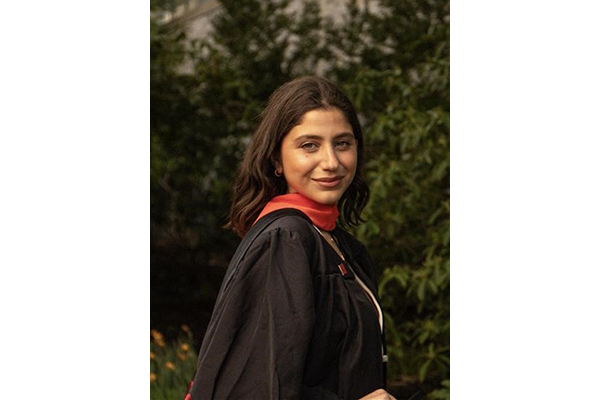Creating Impactful Medical Devices to Improve Lives

Caline Pechdimaljian, MS’25, bioengineering, started her career in pharmaceutical process engineering research and development. Her work with pharmaceutical manufacturing sparked her curiosity for looking into targeted therapeutics and medical device development. The bioengineering master’s program led her to discover her passion for working on technology to improve the health and quality of life of patients and communities.
Caline Pechdimaljian completed her bachelor’s degree in chemical engineering back home in Lebanon at the American University in Beirut. Shortly after graduating, Pechdimaljian started working in engineering production and synthesis of pharmaceutical products at the SSPC center at the University of Limerick in Ireland. While conducting research, she became curious about exploring oncological therapeutics and treatment routes beyond the traditional products manufactured for on-the-shelf. She had the opportunity to join a lab working on targeted experimental therapeutic models for glioblastoma multiforme, a grade IV aggressive brain tumor, at Harvard Medical School and Massachusetts General Hospital. It was there that she met a Northeastern bioengineering master’s student on co-op at a nearby lab who encouraged her to apply to the MS program.
Pechdimaljian knew she wanted to pursue a master’s in bioengineering from Northeastern after learning about the program’s flexibility and experiential learning opportunity. While she initially planned to continue down the therapeutics research route, she quickly decided to pursue a concentration in medical devices and bioimaging after hearing about the exciting innovation in the medical technology industry in Boston. She realized she wanted to work on impactful technologies that have a faster translational impact on the well-being of patients.
In the Classroom
Pechdimaljian said one of the best parts of the bioengineering program was the teaching faculty. She said she has been consistently impressed by the professors and the work they do outside of the classroom. From the courses Pechdimaljian has completed, there were a couple that were standouts for her. The “Medical Physiology” course taught by COE Distinguished Professor of Bioengineering Jeffery Ruberti was particularly interesting to Pechdimaljian. As well as a precision medicine computational course, Pechdimaljian took with Professor Raimond Winslow and “Design of Implants” with Professor Sumner Barenberg, was an equally intriguing course.
Pechidimaljian said the “Design of Implants” course was especially memorable due to a project she worked on for the class. She worked to develop a novel idea for a stem cell reinforced acellular dermal matrix for skin flap necrosis risks associated with breast implant patients. Pechdimaljian said Professor Barenberg brought in a patent lawyer to teach the class the importance of protecting their intellectual property as engineers. She believes this information was very important for every engineer out there to learn to protect their intellectual property, as even the smallest novel ideas can be a very valuable asset to protect.
During her time in the program, Pechdimaljian additionally worked as a research assistant for Assistant Professor Christa Haase. This opportunity allowed Pechdimaljian to explore the route of computational medicine more thoroughly after enjoying the computational medicine course she completed. She briefly focused on the development of a computational pipeline for spatially resolved single-cell sequencing guided by in situ and in vivo imaging in leukemia models.
Co-op Turned to Post-Graduate Job
Pechdimaljian was hired as a research and development engineering co-op at Fresenius Medical Care. At Fresenius, she worked on a project that worked on the design and reliability improvements to a fluidic product line and its accompanying sustaining activities. This work required a lot of hands-on investigative testing on the device. This involved testing out system specifications, running simulated use tests and having to outsource and build different test fixtures to monitor changes in the product specifications. She enjoyed working on this project during her time as a co-op and thought the work she was doing was incredibly interesting. Pechdimaljian additionally enjoyed the work environment that Fresenius created for their co-op students. She said, “You’re valued for your work and you’re able to work on really great projects”.
After completing her co-op and graduating from Northeastern in May of 2025, Pechdimaljian was hired at Fresenius full-time as a project engineer. Her role combines the aspects of product engineering efforts on the same fluidic product line, but with added project management work that focuses on regulatory and compliance objectives for the team. Pechdimaljian has been working full-time for a month now and has been enjoying the work she has been doing.
Reflections
Pechdimaljian reflected on her journey at Northeastern since graduating and starting her new full-time job. She believes the bioengineering master’s program was extremely helpful in preparing her for a career in engineering and gave her the tools to confidently take on any challenges. She loved the versatility of the program and said she was able to take part in many different opportunities; not all centered around bioengineering. She implores anyone who is currently in the program or interested in it to take advantage of the opportunities that come with it and make the most of them.